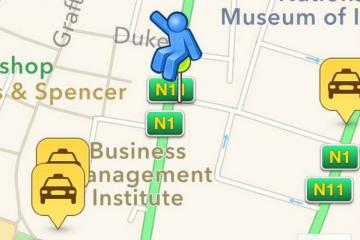 Rob Waugh
Rob WaughFive rules to help you make the next billion-dollar app (hint: think simple)
Only 12 apps in history have made a billion dollars or more, but entrepreneur George Berkowski's new book explains what they have in common - and why the next Facebook-sized hit could be a calendar.
“If you want to make a lot of money, you’ve got to come up with something that’s a human universal,” says app inventor George Berkowski. “Something fundamental. You reinvent the taxi, as Hailo and Uber did, or the address book. It’s got to work across all cultures and all languages.”
Only 12 apps in history have made a billion dollars or more - among them Instagram, the product of a conversation on a holiday in Mexico, and Dropbox, an online storage system, where just 4% of users ever upgrade from the free version.
“It is horrifically difficult to create a billion-dollar app,” says Berkowski, “You don’t just have a good idea, then walk right into success.. Look at the guys who head up those firms - they’re not 21, or even in their twenties, with a few exceptions, like Mark Zuckerberg. On average, they’re 36. You’ve got to keep working, keep executing, fail, deliver. When you create your own perfect storm.”
There are a billion people who use an app every day, and since the iPhone popularised the idea in 2008, we have downloaded 35 billion of them.
[Is Earth trapped in 'space bubble'?]
But 90% of apps only get opened once or twice, then are never used again. Berkowski says. There is still room for big ideas - and lessons from the big successes which could offer tips on
how to create the next one. Many of the most successful apps are games: created by studios with decades of experience. But there is still room for a few simple ideas.
“I think we’re all getting bored of apps,” Berkowski says, “The fad will peter out in two or three years. We have started to expect functions we used to get from apps to be built into phones - and wearables such as watches are going to increase that. But before that happens I think we’ll see at least one app go from nothing to a billion dollars in a year. Instagram took about a year and a half. I have a hunch it will either be a calendar or an alarm clock.”

Rule 1: Think two to three years in the future
“There were already a few magazine-style apps, so Flipboard tried a few different things before they decided, “We’re going to nail our future to the iPad.” At the time, the iPad had just launched, no one knew if it was going to be a success. That’s where the skill comes in. Even if the basic idea has been done before, if you manage to think what things will be like in two to three years’ time and make something before, then you’ve got a chance.”

2. The first page of your app should make people happy
“More than 90% of apps are only ever opened once or twice. You need to engage people. I waved Photoshopped screenshots at literally thousands of people as we launched Hailo: I went round cafes and pubs, asking everyone. That’s why people keep using it: on that first screen, you don’t even have to log in, it just says, “Hail a cab”. It just needs a phone number and a card number: it’s a great first experience. Figure that out, Talk to 200 people. Talk to 500 people. Make a spreadsheet of what they say. That’s what great companies do.”
3. Don’t be afraid of simple ideas: or ones that have been ‘done’
“My hunch is that someone will find something amazing to do with a calendar - maybe it’ll propose what you do on days in the future. There’s already thousands of calendar apps, but none are perfect. My current venture is a camera app - there are already 10,000 photography apps on the app store. It’s obviously quite tricky to come up with something when there’s that level of competition - but there are actually very few good ones. I did what I always do: I talked to people. What problems did they have with their phone? The number one issue was, “I keep running out of space. I don’t sync with my laptop, and it’s frustrating..” A lot of people have an idea what “the cloud” is but don’t know how to use it - it’s a problem. it’s one that afflicts 90% of women in particular. That’s an opportunity.”
4. Know your audience personally - and if you don’t, get to know them
“When we launched Hailo, the key to its success was that we had three taxi drivers working with us, so we knew exactly how taxi drivers thought. I can see exactly why Amazon was interested in Twitch, that service that streams people playing videogames. The company’s young, and small, and watched by 90 million a day. Video is changing quickly - that’s the perfect sort of niche to target.”
“You want to meet those guys, understand what they need. Talk to them, understand that niche. You need to be personally fascinated by that niche - and have more information than the next guy.. Has anyone done it before? Is it already out there? Do people want it? If you’ve got an idea you can’t explain in a sheet of paper, or three sentences, people won’t download it. What is it that makes it special - the users? The software? A piece of hardware?”
5. Don’t sit around having meetings - make money from Day One
“The bar is a lot higher these days in apps,” says Berkowski. “You have to know how your app will make money. Usually you’ve got a tiny team, so your product is a rocketship. It needs to make revenue or profit from the beginning. Most of the work will come after launch, but what you need is to get a baseline app into people’s hands.
[Snapchat Worth $10bn Following Latest Funding Round]
“ There are five basic business models that work - and only one of those is revenue-less at the beginning. The other four need to make money right from the start. The one that doesn’t need money is something like Instagram. It created an audience so hungry and sticky for the images, that 30% of them were coming back daily - it was unheard of. No wonder Zuckerberg was so interested in it. The difficult part is then having to think up a way to make money without alienating that audience.”
“How to Build a Billion Dollar App” by George Berkowski is out Thursday 4 September.

 Yahoo News
Yahoo News 
